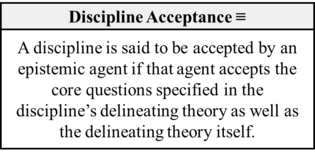Difference between revisions of "Discipline Acceptance"
| Line 2: | Line 2: | ||
|Question=What is '''discipline acceptance'''? How should it be ''defined''? | |Question=What is '''discipline acceptance'''? How should it be ''defined''? | ||
|Topic Type=Definitional | |Topic Type=Definitional | ||
| − | |Description=An [[Epistemic Agent|epistemic agent]] can accept or reject a [[Discipline|discipline]]. It is important, therefore, to understand what this ''acceptance'' amounts to, i.e. what happens at the level of individual [[Epistemic | + | |Description=An [[Epistemic Agent|epistemic agent]] can accept or reject a [[Discipline|discipline]]. It is important, therefore, to understand what this ''acceptance'' amounts to, i.e. what happens at the level of individual [[Epistemic Elements|epistemic elements]] when an agent accepts a discipline. |
|Parent Topic= | |Parent Topic= | ||
|Authors List=Cyrus Al-Zayadi, Paul Patton | |Authors List=Cyrus Al-Zayadi, Paul Patton | ||
Revision as of 15:02, 1 August 2021
What is discipline acceptance? How should it be defined?
An epistemic agent can accept or reject a discipline. It is important, therefore, to understand what this acceptance amounts to, i.e. what happens at the level of individual epistemic elements when an agent accepts a discipline.
In the scientonomic context, this term was first used by Paul Patton and Cyrus Al-Zayadi in 2021. The term is currently accepted by Scientonomy community.
In Scientonomy, the accepted definition of the term is:
- A discipline is said to be accepted by an epistemic agent if that agent accepts the core questions specified in the discipline’s delineating theory as well as the delineating theory itself.
Contents
Scientonomic History
Acceptance Record
| Community | Accepted From | Acceptance Indicators | Still Accepted | Accepted Until | Rejection Indicators |
|---|---|---|---|---|---|
| Scientonomy | 1 August 2021 | This is when Patton and Al-Zayadi's Disciplines in the Scientonomic Ontology that offered a definition of the term was published. This is a good indication that the question of how the term is to be defined is considered legitimate by the community. | Yes |
All Theories
| Theory | Formulation | Formulated In |
|---|---|---|
| Discipline Acceptance (Patton-Al-Zayadi-2021) | A discipline is said to be accepted by an epistemic agent if that agent accepts the core questions specified in the discipline’s delineating theory as well as the delineating theory itself. | 2021 |
If an answer to this question is missing, please click here to add it.
Accepted Theories
| Community | Theory | Accepted From | Accepted Until |
|---|---|---|---|
| Scientonomy | Discipline Acceptance (Patton-Al-Zayadi-2021) | 21 February 2024 |
Suggested Modifications
| Modification | Community | Date Suggested | Summary | Verdict | Verdict Rationale | Date Assessed |
|---|---|---|---|---|---|---|
| Sciento-2021-0006 | Scientonomy | 1 August 2021 | Accept new definitions of subquestion, core question, core theory, discipline, delineating theory, subdiscipline, and discipline acceptance. | Accepted | Prior to the 2024 workshop, Hakob Barseghyan commented on the encyclopedia indicating his support for accepting this modification and noted its potential to underpin further work on discipline dynamics. In fact, a significant amount of observational scientonomy work has been carried out in the past few years (including the paper on the rejection of alchemy by Friesen and Patton (2023),1 as well as some more recent papers) that presupposes the acceptance of these definitions, despite the fact that the modification containing them formally remains open. There was very little discussion about the modification, beyond raising points for the community to look forward to in the future, like a brief discussion between Jamie Shaw and Paul Patton about the need for more research on the difference between disciplines and disciplinary communities. The modification was accepted unanimously with 18 votes. | 21 February 2024 |
Current View
In Scientonomy, the accepted definition of the term is Discipline Acceptance (Patton-Al-Zayadi-2021).
Discipline Acceptance (Patton-Al-Zayadi-2021) states: "A discipline is said to be accepted by an epistemic agent if that agent accepts the core questions specified in the discipline’s delineating theory as well as the delineating theory itself."
Theories and questions can both be the subject of the epistemic stances of epistemic agents.234 Disciplines like biology, physics, and astrology can also be the subject of such stances. For example, biology and physics are accepted by the scientific community of the modern world as disciplines, but astrology is rejected. In our definition, a discipline is said to be accepted by an epistemic agent if that agent accepts the core questions specified in the discipline's delineating theory, as well as the delineating theory itself.5
This definition takes discipline acceptance to be derivative of theory acceptance and question acceptance. It requires first, that an agent accepts the delineating theory that specifies that a particular set of core questions characterize a discipline. For example, the scientific community accepts that the question 'how do matter and energy behave? is a core question of modern physics. The community also accepts the question itself. Therefore, they can be said to accept physics as a discipline. The scientific community of the modern world also accepts that the question 'how do the positions of celestial objects at the time of one's birth influence one's character?' is a core question of astrology. However, they do not accept the question itself, because they reject its supposition that such an influence exists. Thus, the scientific community rejects the discipline of astrology.
Related Topics
This topic is also related to the following topic(s):
References
- ^ Friesen, Izzy and Patton, Paul. (2023) Discipline Dynamics of Chymistry and Rejection of Alchemy. Scientonomy 5, 93-110. Retrieved from https://scientojournal.com/index.php/scientonomy/article/view/42268.
- ^ Barseghyan, Hakob. (2018) Redrafting the Ontology of Scientific Change. Scientonomy 2, 13-38. Retrieved from https://scientojournal.com/index.php/scientonomy/article/view/31032.
- ^ Rawleigh, William. (2018) The Status of Questions in the Ontology of Scientific Change. Scientonomy 2, 1-12. Retrieved from https://scientojournal.com/index.php/scientonomy/article/view/29651.
- ^ Patton, Paul. (2019) Epistemic Tools and Epistemic Agents in Scientonomy. Scientonomy 3, 63-89. Retrieved from https://scientojournal.com/index.php/scientonomy/article/view/33621.
- ^ Patton, Paul and Al-Zayadi, Cyrus. (2021) Disciplines in the Scientonomic Ontology. Scientonomy 4, 59-85. Retrieved from https://scientojournal.com/index.php/scientonomy/article/view/37123.
